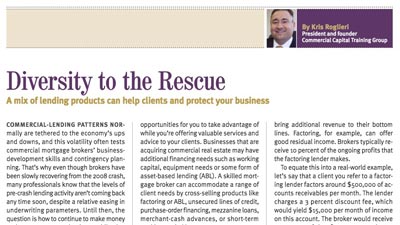Diversity to the Rescue: A Mix of Commercial Lending Products Can Help Clients and Protect Your Business
By: Kris Roglieri, President and Founder, Commercial Capital Training Group
As published in Scotsman Guide’s Commercial Edition, December 2012.
 Commercial lending patterns normally are tethered to the economy’s ups and downs, and this volatility often tests commercial mortgage brokers’ business-development skills and contingency planning. That’s why even though brokers have been slowly recovering from the 2008 crash, many professionals know that the levels of pre-crash lending activity aren’t coming back any time soon, despite a relative easing in underwriting parameters. Until then, the question is how to continue to make money and grow a mortgage business while also staying prepared for any economic swings.
Commercial lending patterns normally are tethered to the economy’s ups and downs, and this volatility often tests commercial mortgage brokers’ business-development skills and contingency planning. That’s why even though brokers have been slowly recovering from the 2008 crash, many professionals know that the levels of pre-crash lending activity aren’t coming back any time soon, despite a relative easing in underwriting parameters. Until then, the question is how to continue to make money and grow a mortgage business while also staying prepared for any economic swings.
The answer is simple: Diversify your product portfolio.
Many brokers have one-dimensional business models, meaning that they only offer one or two types of financing for businesses or commercial real estate investors. Although targeting a particular market is good in terms of focusing on certain products and client segments, it can be devastating if the market conditions turn unfavorable for your particular niche. It also severely limits your ability to capitalize on profits and opportunities that are within your reach.
With banks not lending as much as they once did, more and more borrowers are turning to commercial mortgage brokers or consultants for help with their capital needs. Brokers who are knowledgeable of, and skilled in, a variety of products and financing alternatives will be in a better position to properly serve and lead clients to the best options available in today’s market.
For example, if you’re in the business of brokering Small Business Administration (SBA) loans, or if you typically broker owner-occupied real estate transactions, there could be a plethora of lucrative opportunities for you to take advantage of while you’re offering valuable services and advice to your clients. Businesses that are acquiring commercial real estate may have additional financing needs such as working capital, equipment needs or some form of asset-based lending (ABL). A skilled mortgage broker can accommodate a range of client needs by cross-selling products like factoring or ABL, unsecured lines of credit, purchase-order financing, mezzanine loans, merchant-cash advances, or short-term working-capital loans.
Find various products
There certainly are dozens of commercial lending products that can provide lucrative opportunities for commercial mortgage brokers. For example, factoring is a product that allows a business to turn its accounts receivables into cash without waiting 30 days, 60 days or 90 days. It can be a great option for small businesses that need capital to grow without taking on more debt.
In some cases when the factoring product is nonrecourse, it also can serve as a type of credit insurance to businesses. To be eligible, the business should have good, creditworthy account debtors. Keep in mind that in a struggling economy the demand for this type of financing typically increases in response to traditional banks restricting their lending.
Purchase-order financing is another example of a product that your clients can take advantage of. It’s based on the business having purchase orders from creditworthy companies and allows the business to finance whatever it produces or makes.
Get income
Commercial mortgage brokers who add this type of product to their offerings can bring additional revenue to their bottom lines. Factoring, for example, can offer good residual income. Brokers typically receive 10 percent of the ongoing profits that the factoring lender makes.
To equate this into a real-world example, let’s say that a client you refer to a factoring lender factors around $500,000 of accounts receivables per month. The lender charges a 3 percent discount fee, which would yield $15,000 per month of income on this account. The broker would receive 10 percent of that $15,000, equating to $1,500 per month for the life of the account.
The average length of time a client stays with a particular factoring lender is three years. By closing a couple of factoring transactions every quarter, brokers can build up strong residual income for years to come.
Protect your business
Commercial mortgage brokers who spend their time on investment real estate transactions should consider adding new products. By doing so, they won’t just create additional sources of revenue; they’ll also essentially create a hedge against economic fluctuations that could affect their primary businesses. By having multiple products that flourish in different economic cycles, brokers can have other profit avenues to concentrate on or substitute in times when commercial mortgages are going through a slow period.
In reality, many commercial mortgage brokerages that focus only on one niche take the risk of being forced out of business when the industry stumbles into a tough economic stretch.
Commercial mortgage brokers who are interested in diversifying their offering of products should start with learning about and understanding these products. They also should develop connections to professionals in the commercial lending industry. This process may not be as easy as learning one product and then selling it, however, because it requires learning about structuring deals and products, as well as finding the right business channels for commercial lending.
***
Having a diverse product portfolio is the key for commercial mortgage brokers who are invested in growing a lasting business. Success in the mortgage industry must be grounded in proper customer service and in offering clients a full spectrum of commercial lending products — with the ability to explain and compare them — to fulfill their needs.
Kris Roglieri is a New York-based financier, president and founder of multiple commercial finance and commercial lending companies including Prime Commercial Lending (offering financing products for businesses and commercial real estate), Durham Commercial Capital (a non-recourse factor) and Commercial Capital Training Group (a specialized commercial finance training company) based in Albany, New York. Roglieri’s companies provide all types of commercial lending directly for national and international clients. Reach him at (518) 320-7600 or [email protected].









